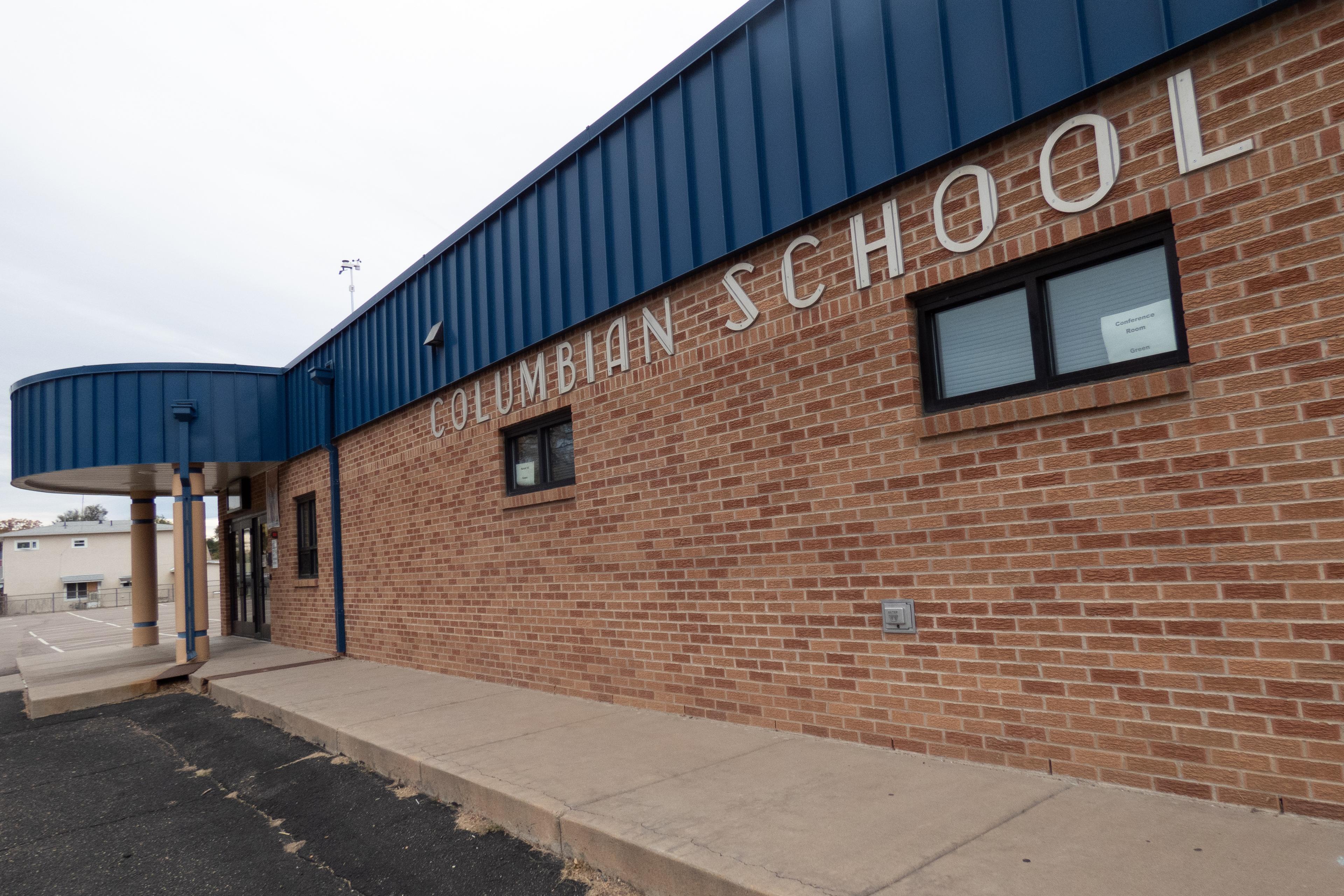
Updated: 3:45 p.m. Nov. 9 -- Democratic presidential candidate Hillary Clinton won Colorado. Democratic U.S. Sen. Michael Bennet will return to Washington, D.C. for a second term. Colorado's incumbents in the U.S. House of Representatives all won re-election. But the biggest news of the night: Republican Donald Trump has been elected the 45th president of the United States.
Read NPR's full report on the tumultuous and divisive campaign that won over white voters with the promise to "Make America Great Again." He crossed the 270 electoral vote threshold at 2:31 a.m. ET with a victory in Wisconsin, according to Associated Press projections.
Elsewhere in Colorado, voters approved a hike in the state's minimum wage, a return to presidential primaries, medically assisted death, and the metro area's SCFD tax. Voters rejected ColoradoCare, the state-run health insurance proposal.
Presidential Race
The Associated Press projected that Democrat Hillary Clinton won Colorado's electoral votes. Note that the results shown above are for Colorado only. You can find the national presidential results here.
Congressional Races
United States Senate
The Associated Press says U.S. Sen. Michael Bennet has won re-election, defeating Republican Darryl Glenn, Libertarian Lily Tang Williams, Bill Hammons of the Unity Party, and Arn Menconi of the Green Party. More on the Senate race here.
1st Congressional District
Ten-term Democratic U.S. Rep. Diana DeGette defeated Libertarian Darrel Dinges and Republican Charles "Casper" Stockham. CD 1 covers Denver. More on congressional races here.
2nd Congressional District
Democratic U.S. Rep. Jared Polis won re-election over Republican Nicholas Morse and Libertarian Richard Longstreth. CD 2 covers the central and north Front Range suburbs, as well as Fort Collins, Boulder, Vail, Idaho Springs and Grand Lake. More on congressional races here.
3rd Congressional District
Republican U.S. Rep. Scott Tipton, first elected in 2008, defeated Democrat Gail Schwartz and Libertarian Gaylon Kent. The expansive CD 3 covers the Western Slope and Pueblo. More on congressional races here.
4th Congressional District
First-term Republican U.S. Rep. Ken Buck defeated Libertarian Bruce Griffith and Democrat Bob Seay. CD 4 covers the Eastern Plains. More on congressional races here.
5th Congressional District
Republican U.S. Rep. Doug Lamborn, first elected in 2006, has defeated Libertarian Mike McRedmond and Democrat Misty Plowright. CD5 Runs across the center of the state, from El Paso County, west to Salida, Buena Vista and South Park. More on congressional races here.
6th Congressional District
Republican U.S. Rep. Mike Coffman, first elected in 2008, defeated Libertarian Norm Olsen and Democrat Morgan Carroll. CD 6 covers the southern, eastern and northern suburbs around Denver, including Highlands Ranch, Aurora and Brighton. More on congressional races here.
7th Congressional District
Democratic U.S. Rep. Ed Perlmutter, first elected in 2006, defeated Republican George Athanasopoulos and Libertarian Martin L. Buchanan. CD 7 covers Denver’s western and northern suburbs including Lakewood, Arvada, Westminster, Northglenn and Thornton. More on congressional races here.
Ballot Measures
Amendment 69 - Statewide Health Care System
Voters shot down Amendment 69, which would have created a first-in-the-nation statewide tax-funded universal health plan called ColoradoCare. More on ballot measures here.
Amendment 70 - State Minimum Wage
Amendment 71 - Requirements For Constitutional Amendments
Voters passed Amendment 71, which will make it harder for citizen-backed state constitutional amendments to get on ballots. It will require that signatures be gathered from 2 percent of registered voters in all of Colorado’s 35 state Senate districts. The amendment will also require that 55 percent of voters approve a measure, rather than just a simple majority. More on ballot measures here.
Amendment 72 - Increase Cigarette And Tobacco Taxes
Voters rejected Amendment 72, which would have more than tripled the tax on a pack of cigarettes, from 84 cents a pack to $2.59. Taxes on other tobacco products would also rise, by 22 percent. The proposal would have raised $315 million in its first year, paying for a variety of health-related programs including smoking prevention. More on ballot measures here.
Amendment T - No Exception To Involuntary Servitude Prohibition
Article II, Section 26 of the Colorado Constitution says, “There shall never be in this state either slavery or involuntary servitude, except as a punishment for crime, whereof the party shall have been duly convicted.” Amendment T would have ended that exception, but voters rejected it. More on ballot measures here.
Amendment U - Exempt Certain Possessory Interests From Property Taxes
Voters rejected Amendment U, which called for the elimination of property taxes for individuals or businesses that use government-owned property for private benefit worth $6,000 or less. More on ballot measures here.
Ballot Issue 4B - Denver Metropolitan Scientific And Cultural Facilities District
Voters have re-authorized the Scientific and Cultural Facilities District, a cultural fund that comes from a 0.1 percent sales and use tax in seven counties: Adams, Arapahoe, Boulder, Broomfield, Denver, Douglas and Jefferson. Voters approved extensions in 1994 and 2004. More on ballot measures here.
Proposition 106 - Access To Medical Aid-In-Dying Medication
Proposition 106 passed. The measure will let terminally ill patients take their own lives with medication prescribed by a physician. Colorado will be the sixth state where this is legal, joining Oregon, Washington, California, Montana and Vermont. The measure is modeled after Oregon’s law. More on ballot measures here.
Props 107 & 108 - Presidential Primary Elections/Unaffiliated Voter Participation
The Associated Press says voters passed Proposition 107, which will replace political party caucuses with a state run presidential primary. It will also open that primary to unaffiliated voters. That means they'd be able to pick a presidential candidate for the general election even though they don't belong to a party. More on ballot measures here.
Companion measure Proposition 108 opens down-ballot primaries to unaffiliated voters.
Colorado General Assembly
With the Colorado House considered safely in Democratic hands, the Senate was the prize both parties were arm wrestling for. Republicans will continue to hold a one-seat senate majority as the legislature will stay split. The deciding race was Republican Kevin Priola defeating his Democratic challenger Jenise May in the Adams County senate district currently held by Democrat Mary Hodge - who didn't seek re-election.
Marijuana
In Question 200 in Pueblo County, voters opted not to shut down retail marijuana stores, grow operations and related businesses. Ordinance 300 in Denver asked voters to approve a city and county measure that would open just about any business to marijuana consumption. The results there were still close to call Wednesday afternoon. More on ballot measures here.
Education Funding
There are about 62 different local education funding measures spread across 44 school districts, according to the Colorado School Finance Project. These schools want to take advantage of high voter turnout to try and get back to the funding levels they had before the Great Recession.
University of Colorado Board of Regents
The nine-person board is the governing body that oversees the University of Colorado’s $3.7 billion budget. It sets tuition and priorities and hires the president and other top leadership. The university has a big economic impact. It’s Colorado’s third largest employer and puts $7 billion a year into the economy.









